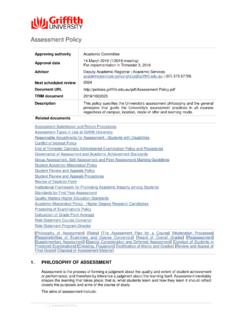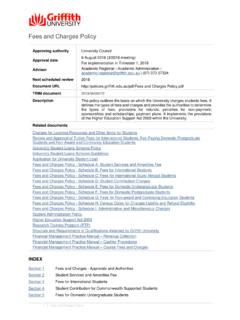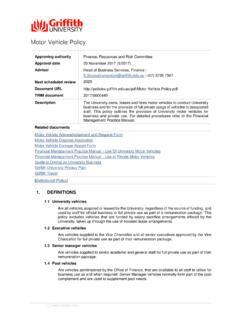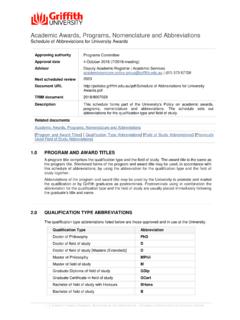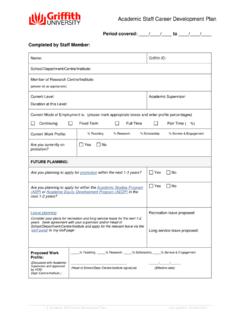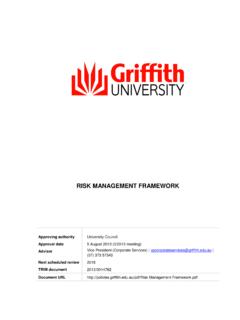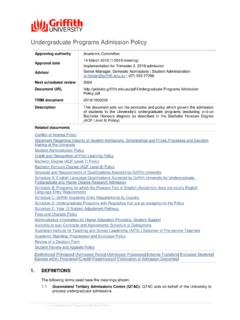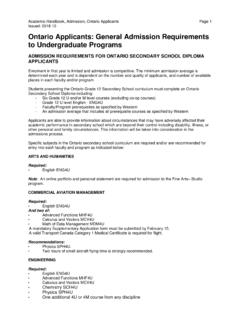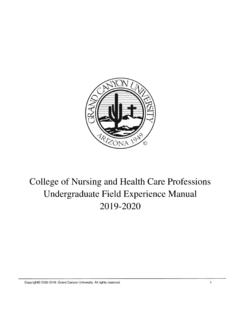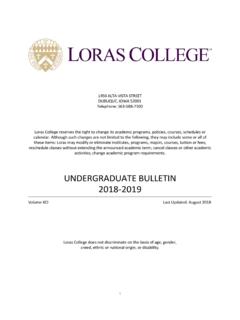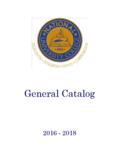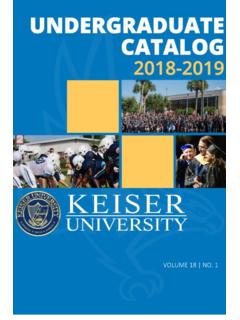Transcription of Postgraduate Programs Admission Policy - Pages
1 Postgraduate Programs Admission Policy Approving authority Academic Committee Approval date 17 November 2016 (5/2016 meeting). Advisor Senior Manager, Domestic Admissions | Student Administration | (07) 555 27286. Next scheduled review 2020. Document URL Programs Admission TRIM document 2019/0000038. Description This document sets out the principles and Policy which govern the Admission of students to the University's Programs described in the Postgraduate Qualifications (AQF Level 8 & 9) Policy excluding Masters Research Programs . Related documents Postgraduate Qualifications (AQF Level 8 & 9) Policy Conflict of Interest Policy Statement Regarding Integrity of Student Admissions, Scholarships and Prizes Processes and Decision Making at the University Schedule A: English Language Qualifications Accepted by Griffith University for Undergraduate, Postgraduate and Higher Degree Research Admission Schedule B.
2 Programs for which the Pearson Test of English (PTE Academic) does not satisfy English language entry requirements Student Administration Policy Academic Awards, Programs , Nomenclature and Abbreviations Credit and Recognition of Prior Learning Policy Structure and Requirements of Qualifications Awarded by Griffith University Fees and Charges Policy Role Statement Program Director Student Review and Appeals Policy Student Review and Appeals Procedures Review of Decision Form [Definitions] [ Admission Principles] [ Admission Criteria] [English Language Requirements] [ Admission Process] [Excluded Students] [Quotas within Programs ]
3 [Transfer to Graduate Entry Medical Program from another University] [Credit] [Readmission] [Appendix A Relevant Officers]. 1. DEFINITIONS. Advanced standing is the granting of block credit of a trimester /teaching period or more. Advanced standing indicates that the student is deemed to have satisfied all the program requirements that are embedded in the trimester (s)/teaching period(s) for which block credit has been awarded. Advanced standing reduces the number of courses the student must undertake to successfully complete the program. AQF qualification is a completed University accredited program of learning that leads to formal certification that a graduate has achieved the learning outcomes as described in the AQF.
4 Coursework is a method of teaching and learning that leads to the acquisition of skills and knowledge that does not include a major research component. Commonwealth Supported Places (CSP) are available to domestic students (see Citizenship Requirements) and which are funded partly on the basis of the Commonwealth Grant Scheme and partly through the fee the student is charged, which is called the "Student Contribution". 1 Postgraduate Programs Admission Policy Citizenship requirements to hold a Commonwealth supported place a student must be an Australian citizen; or an Australian permanent resident or holder of an Australian Permanent Humanitarian visa.
5 Or be a New Zealand citizen. Discipline refers to a defined branch of study or learning consistent with the field of education classification in the Australian Standard Classification of Education (ASCED). The ASCED includes 12. broad fields of education with each classification further divided into narrow and detailed fields of education. Same discipline qualifications are designed to deepen knowledge, skills and application, and different discipline qualifications are designed to broaden knowledge, skills and application through further learning. Genuine Temporary Entrant (GTE) is a person whose circumstances indicate that their intention is for a temporary stay in Australia.
6 Genuine Student (GS) is a student who intends to obtain a successful educational outcome and has the language, educational and material background to have a reasonable chance of achieving this educational outcome. A person applying to study in Australia must be both a GTE and a GS. Factors considered by the Department of Home Affairs when assessing an applicant's GTE and GS status includes: English language proficiency; financial capacity; prerequisite schooling; age requirements; and intention to comply with visa conditions. International student places refers to places which are available to international students who hold an Australian student visa.
7 Learning profile is a statement of an applicant's achievements of learning outcomes, knowledge, skills and competencies, supported by appropriate evidence, relevant to the particular program for which Admission is sought. Nested qualifications are purposely designed qualifications that enable explicit articulation pathways and encompass more than one AQF level and/or qualification type. Prior learning is learning that has taken place prior to Admission to a program of the University or prior to undertaking a relevant component of a program. Formal learning is the learning that takes place through a structured program of learning that leads to the full or partial achievement of an officially accredited qualification.
8 Examples of formal learning include study undertaken with other Australian Higher Education Providers and study at recognised overseas institutions. It also includes credentialed Programs provided by recognised professional bodies, employers and other authorities. Non-formal learning refers to learning that takes place through a structured program of learning but does not lead to an officially accredited qualification. Examples of non-formal learning are: learning and training activities undertaken in the workplace, voluntary sector or in community-based settings. Informal learning is learning gained through work, social, family, hobby or leisure activities and experience.
9 Unlike formal or non-formal learning, informal learning is not organised or externally structured in terms of objectives, time or learning support. Remoteness Areas (RA) are five (5) areas defined in the geographic classification system ASGC-RA: RA1 Major Cities of Australia RA2 Inner Regional Australia RA3 Outer Regional Australia RA4 Remote Australia RA5 Very Remote Australia RAs are determined by the physical distance of a location from the nearest urban centre (access to goods and services) based on population size Research comprises systematic experimental and theoretical work, application and/or development that results in an increase in the dimensions of knowledge.
10 The term research includes original, exploratory, experimental, applied, clinically or work-based and other forms of creative work undertaken systematically to increase knowledge and understanding, deploying a range of research principles and methodologies. Research is specified in the AQF learning outcomes for the Masters Degree. The amount and type of research varies in each of the Masters degree qualifications. 2 Postgraduate Programs Admission Policy 2. Admission PRINCIPLES. The University is committed to operating a Postgraduate Admission process which is demonstrably fair, transparent and supported by appropriate and robust policies and procedures.
